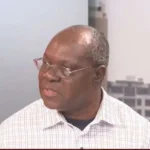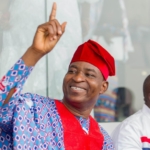
Legal practitioner and lecturer, Thaddeus Sory, has argued that under Ghana’s Constitution, “stated misbehaviour” is an objective standard, not a subjective one.
He said the framers of the Constitution intended it to be a compact guide that reflects the expectations of citizens rather than a rulebook spelling out every detail.
Speaking on JoyNews’ PM Express on Monday, October 20, Mr Sory explained that constitutional provisions like “stated misbehaviour” or “incompetence” must be interpreted through the lens of public expectation since justice emanates from the people.
Read also: Mahama removes Chief Justice Gertrude Torkornoo on grounds of stated misbehaviour
He said public confidence is central to the assessment of any judge or public officer.
“If the Chief Justice gets drunk whilst in office, that’s a stated misbehavior,” he said, adding that such conduct undermines public trust even if not explicitly listed in the Constitution.
Mr Sory argued that it is impossible to codify every conceivable act that could amount to misbehaviour.
“Can you set all of that out? That’s not possible,” he said, emphasising that the Constitution deliberately leaves room for interpretation based on evolving social standards.
He explained that this is why the Constitution provides for a committee of inquiry composed partly of laypersons.
“Justice emanates from the people. If your Chief Justice does a particular type of thing, would you still have confidence in her as the person to lead the justice system?” he asked.
The lawyer maintained that laypersons bring an essential perspective to such committees because they represent society’s moral and ethical expectations.
“Left to me alone, all of those people should be lay people,” he said. “We, those involved in the justice system, judge ordinary men from whom justice emanates. If it affects us, let them also judge us.”
Read also: CJ removal: Definition of ‘stated misbehaviour’ still unknown – Baffour Awuah
Sory insisted that misbehaviour must be determined on a case-by-case basis, but that does not make the process arbitrary. “It has predictability,” he said.
“Once you occupy an official position, the public can judge you by their expectations of fairness and accountability.”
He cautioned against attempts to overdefine or limit constitutional terms, noting that even older democracies still live with imperfect systems.
“There are 200-year-old constitutions with the most atrocious provisions,” he said.
“There’s a constitution of a so-called democracy where a president can win an election not with the majority of votes, but with a minority — and they haven’t complained.”
Sory concluded that in a democracy, accountability must always be measured by the public’s sense of justice.
“At the end of the day, everybody is accountable to society,” he said.




